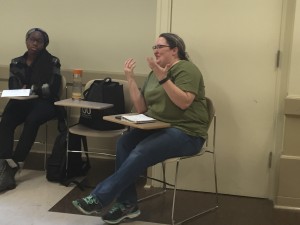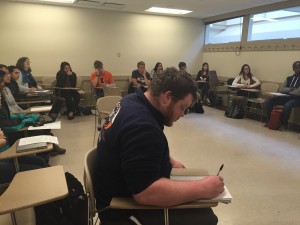
When graduating seniors come to the English Advising Office to pick up their tickets for Convocation, we ask them, “What piece of advice would you give to incoming students in our majors?”
Common themes emerge. The photo above depicts one of many responses urging incoming students to check in regularly with the academic advisers, Anna Ivy and Kristine McCoskey.
It’s important advice, but there’s more to being a successful English department major:
“Really read all of the books assigned, participate in class, and befriend your professors. You will get so much more out of your education here if you really put your whole self into learning.”
What does it mean to “put your whole self into learning”?
It means challenging yourself:
- “Listen to other students about the best professors, not the easiest ones.”
- “Take classes you aren’t comfortable taking. Get to know professors. Go to talks and free lunches and rallies. Get involved!”
- “Take risks! Write that complicated thesis. Choose the most difficult prompt. Bring up that weird discussion question.”
- “Don’t be afraid to challenge assumptions made by your professors.”
- “First drafts always suck. Keep at it. Refresh yourself if need be. But never give up.”
Also, exploring:
- “Take the most interesting, weirdly specific classes that exist. They are always the most worthwhile.”
- “Get to know as many people as you can in your classes. By senior year you recognize almost everyone in the English department.”
- “Take advantage of everything the department has to offer! There are many great resources, organizations, and events that are so, so beneficial!”
Finally, be true to yourself:
- “Embrace being an English major. We don’t study complex math or taxes or anything strictly applicable for any one job. No, we study what it means to be human, which are the most important lessons we should seek to grasp.”
- “Do not be afraid to love and cherish what you study.”
- “Don’t underestimate the importance of self-care and mutual care—including giving yourself permission to pursue your passions, advocate for your interests, and start a riot.”

 popular demand, here are some of the sites that U of I English/CW majors have found helpful for landing jobs:
popular demand, here are some of the sites that U of I English/CW majors have found helpful for landing jobs:
 field for English/CW majors and anyone else interested in making creative content, but it’s also highly competitive, drawing people from a wide range of fields who love video games. To learn more about how English/CW and other humanities majors can position themselves to enter this industry, we brought Anne Odom to campus on April 12. Anne works as a project manager for DS Volition, the video game company here in Champaign. It’s not the career one might expect from someone who majored in philosophy and minored in Russian literature in college, but Anne argues that her experience in making arguments. wrestling with complex material, and using her intellectual curiosity has helped her be good at what she does.
field for English/CW majors and anyone else interested in making creative content, but it’s also highly competitive, drawing people from a wide range of fields who love video games. To learn more about how English/CW and other humanities majors can position themselves to enter this industry, we brought Anne Odom to campus on April 12. Anne works as a project manager for DS Volition, the video game company here in Champaign. It’s not the career one might expect from someone who majored in philosophy and minored in Russian literature in college, but Anne argues that her experience in making arguments. wrestling with complex material, and using her intellectual curiosity has helped her be good at what she does. s stretch ahead of you. If your summer location doesn’t give you much scope for a career-focused job, if you need to make money waiting tables instead of taking an unpaid internship, if you left it too late to find a resume-building opportunity…you can always make something.
s stretch ahead of you. If your summer location doesn’t give you much scope for a career-focused job, if you need to make money waiting tables instead of taking an unpaid internship, if you left it too late to find a resume-building opportunity…you can always make something.